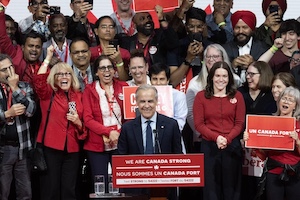Liberal Leader Carney Wins Canadian Election, Vows to Triumph in U.S.-Canada Trade War

Canada held its 45th federal House of Commons election on the 28th, in which the Liberal Party, led by incumbent Prime Minister Mark Carney, secured a majority of seats, ensuring Carney's re-election. In his victory speech, Carney emphasized the need for national unity in the face of threats from the United States. He stated bluntly that U.S. President Donald Trump wants Canada's land, resources, and sovereignty—but firmly declared that such ambitions will never be realized.
Pierre Poilievre, leader of the Conservative Party of Canada, conceded defeat in the federal election and stated that he would work with the Liberal government to confront President Trump’s trade war and annexation threats. According to international media reports, Poilievre stressed that the Conservatives would focus on defending Canada’s interests by cooperating with the Prime Minister and other parties to resolve tariff issues and protect national sovereignty.
In the election held on the 28th, all 343 seats in the House of Commons were contested. The ruling Liberal Party won 168 seats, securing victory, with Carney continuing as Prime Minister. The Conservative Party came in second with 144 seats. However, the Liberals fell short of the 172 seats needed for a majority, and will need to form a coalition government with other parties. This marks the fourth consecutive election victory for the Liberal Party.
Trump’s tariff threats and remarks about Canada becoming the “51st state” sparked a wave of patriotism across the country, boosting Carney’s popularity. Running on his strong economic credentials, Carney campaigned on reducing Canada’s dependence on the U.S., while the Conservatives focused on issues such as the housing crisis and the rising cost of living. Carney previously served as the governor of both the Bank of Canada and the Bank of England.
The Liberal victory is seen as driven by voter resistance to the Conservatives, backlash against Trump’s tariff policies, and the return of center-left voters after former Prime Minister Justin Trudeau’s resignation. While the election highlighted the growing strength of the Conservatives, minority governments in Canada often face challenges to long-term stability.
- 190 reads
Human Rights
Fostering a More Humane World: The 28th Eurasian Economic Summi

Conscience, Hope, and Action: Keys to Global Peace and Sustainability

Ringing FOWPAL’s Peace Bell for the World:Nobel Peace Prize Laureates’ Visions and Actions

Protecting the World’s Cultural Diversity for a Sustainable Future

Puppet Show I International Friendship Day 2020

